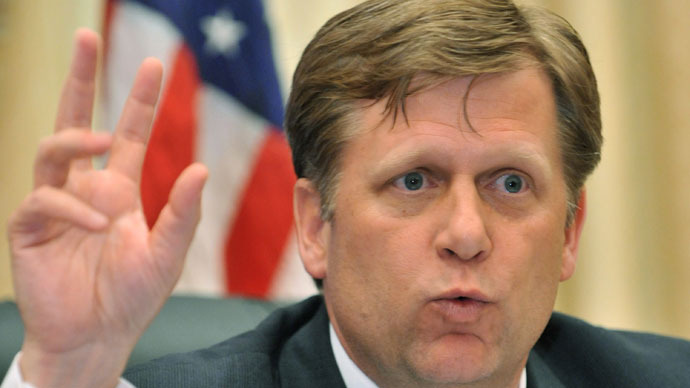The Russian advisory body that unites influential figures officially invited the US Ambassador for a discussion in order to prevent ‘distorted rumors and insinuations’ that abound in the adoption controversy.
“Recently there is a very saturated and controversial flow of information both from Russia and from the United States that concerns the issue of protecting the children’s rights. In our opinion only a dialogue would allow us to put an end to distorted rumors and insinuations. This is why we in the Public Chamber decided to hold a roundtable and invite US Ambassador to Russia Michael McFaul to it. I hope that the honorable Mr. McFaul can help us to make clear the position of the US side over this issue,” the head of the Citizens’ Security Commission, Anatoly Kucherena, stated according to the chamber’s press service.
He also said he hoped that an open discussion could help to establish close personal relations with representatives of American NGOs who work in the adoptions sphere.
The Russian parliament has already invited McFaul to the hearings dedicated to the fate of some Russian kids adopted by US parents. The diplomat officially turned down the invitation, saying that it was not an established practice for a US diplomat to testify before foreign parliamentary bodies. However, he expressed his readiness to meet Russian officials in private and discuss all urgent issues.
The head of the State Duma international relations committee, Aleksey Pushkov called McFaul’s refusal a regrettable fact, but noted that it only testified that the United States was not ready for the serious dialogue. Pushkov also recalled that despite the alleged impossibility of speaking before foreign parliamentarians in April 2012, Ambassador McFaul did take part in a roundtable of the Russian Upper House committee for international relations dedicated to the cancellation of the Jackson-Vanik amendment.
The day after refusing the invitation from the State Duma, McFaul published an extensive letter in Russian and English in his internet blog. In it he said that he was deeply concerned by the way some Russian commentators were portraying the US legal system, US diplomats and Americans in general.
“It is time for sensational exploitations of human tragedy to end and for professional work between our two countries to grow, on this issue and many others,” he wrote.
These complaints were a reaction to the latest outburst in the comments of Russian officials and media over the death of three-year-old Maksim Kuzmin (to whom Ambassador McFaul referred by his adopted US name, Max Shatto). The toddler died on January 21, 2012, but Russian diplomats and children’s rights officials claimed that they only learned about it in mid-February.
Russia’s children’s right ombudsman Pavel Astakhov initially called Maksim’s death a murder and suggested that the adoptive parents were to blame. Shortly afterwards he agreed that the incident could be a case of manslaughter after Texas police said they were still waiting for the autopsy report and it was too early to incriminate anyone in what could be simply a tragic accident.
Ambassador McFaul wrote in his blog that he was “deeply distraught” to learn of Maksim Kuzmin’s death.
This was the latest in a string of episodes in which Russian children suffered from abuse or careless treatment by their US parents. Such cases and the alleged unwillingness of the US authorities to cooperate with Russian consular services in them caused Russia to approve the so-called Dima Yakovlev Law earlier this year.
The law orders an asset freeze and entry ban on US officials who are complicit of violation of human rights, but it also completely bans the adoption of Russian children by US citizens and by proxy of US organizations.
The bill caused broad controversy both in Russia and abroad, but the authorities continue to develop this subject.
On Friday a district court in Moscow considered Russian investigators’ request to arrest in absentia five US citizens suspected of abusing their Russian adopted children. The court ordered the arrest of only one suspect – Michael Grismore, who faces charges of raping his adopted Russian daughter.
The court refused to uphold the arrest warrant in three other
cases (including the case of adoptive father of Dima Yakovlev) and
postponed the hearings into one case until next week.

